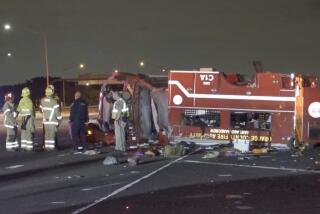War protester settles free-speech suit with Santa Barbara
A man arrested on Veterans Day in 2004 while using a bullhorn to publicly recite the names of military casualties in Iraq has reached a $17,000 settlement in his lawsuit against the Santa Barbara Police Department.
The city will pay the damages to Michael Tocher, 37, who was arrested Nov. 11, 2004, at a downtown plaza while reading a Defense Department list of U.S. and allied casualties.
The city also will pay $87,000 for his attorneys’ fees.
In addition, the city will adopt a policy on arrests for disturbing the peace and instruct its officers on that policy, according to the settlement filed Thursday in U.S. District Court in Los Angeles.
The draft policy outlines that officers must give people warning, document the warning and allow people to lower their voices or move before making an arrest for disturbing the peace.
Tocher’s lawyers or someone they designate will be allowed to observe at least one training session, the draft policy also notes.
“In this country, you can’t go to jail just because someone doesn’t like what you say or how loudly you say it,” Peter Bibring, a staff attorney for the American Civil Liberties Union of Southern California, said Friday.
“Our settlement basically ensures that Santa Barbara police officers are clearly informed as to the limits of disturbing the peace in these situations, and, more importantly, informed as to the rights of people making political speech.”
Santa Barbara City Atty. Stephen Wiley did not return calls Friday seeking comment.
ACLU attorneys representing Tocher sued in 2005, claiming that police could not “demonstrate a compelling, important, or even rational basis” for allegedly violating their client’s 1st Amendment right to free speech.
Wiley said the officers were trying to get Tocher to quit using his bullhorn after a businessman across busy State Street complained about the noise.
“He wasn’t told he couldn’t continue to speak,” Wiley said in 2005. “And it had nothing to do with what he was saying.”
Tocher, an electrical engineer from Nipomo, Calif., decided to observe the holiday with his brother George, a Los Angeles social worker, by meeting in their hometown and reciting the names of the fallen troops.
Tocher had listed about a third of the 1,200 casualties as of that time when Officers Morris Rivard and Rayshun Drayton stopped them, saying they had received a complaint, according to the lawsuit.
When Tocher questioned Rivard’s request for identification, the officer handcuffed him, had him wait on a bench for 30 minutes, drove him to police headquarters and cited him, the lawsuit states.
Tocher’s brother was not arrested or cited.
*
More to Read
Sign up for Essential California
The most important California stories and recommendations in your inbox every morning.
You may occasionally receive promotional content from the Los Angeles Times.










